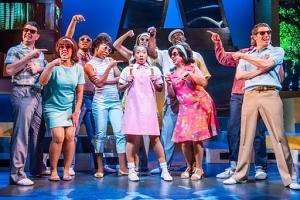Review of The Bubbly Black Girl Sheds Her Chameleon Skin at Theatre Royal Stratford East
As the musical charm of LA has recently been embraced in full saccharine technicolor by the hit film 'La La Land' Kristen Childs' well meaning yet somewhat tepid musical about a young girl's battle with self identity offers a more diverse representation of the 'city of stars' yet somehow doesn't go far enough to act as an antidote to its peppy verve and quiet optimism. Part autobiography this musical first premièred off-Broadway in 1999 and has finally found its way to the Theatre Royal Stratford East, but whilst this gentle and generally well-played production wears its heart on its sleeve it doesn't quite offer the political and social commentary necessary to make its core message heard.
Episodic in nature the musical begins in LA in 1963 where Viveca or 'Bubbly' breezes through her childhood with an affable charm and effervescent grin. Beneath the surface and her overt positivity lie questions about her race that challenge her parents - why does she prefer her white doll over her black one? What does it mean to be called 'oreo' by her black friends and is it possible or acceptable to be asked to 'perform' black?
The show's central question taps into the performativity of race and how internalized racism can manifest throughout any context and the fact that Bubbly goes on to become a performer herself in later life after her move to New York City in 1970 compounds this theme. Some of the most powerful scenes are set within an audition room as she finds herself in true 'Chorus Line' fashion exposing herself and forced to question what it means to 'act' either black or white.
Childs' aimed to write a story of 'hope and humour about the ridiculousness of racism and intolerance' and on the whole the piece hits the right tone. The humour is perhaps over played in parts but it is welcomed by the audience who absorb Bubbly's spirit and welcome her story as a personal, albeit rushed and slightly blinkered view of America throughout some of the most important decades of social change. In many ways, that's the point. Rather than offer a sweeping or broad view of political assassinations, the organisation of the civil rights movement and the reaction against the Vietnam War the piece instead zooms in on one personal experience and allows us to unpack these wider contextual points against a very personal journey of self discovery, and on that level it succeeds.
Sadly the score feels too generic and flimsy to fully support this narrative choice and whilst it ably pastiches the sound of the time it doesn't mature until the second act when we're finally invited into Bubbly's psyche and she speaks to us musically. For a musical that wrestles with self identity and a conflict between the outer and the inner you'd expect a much more solid musical score that comes from within, instead we're offered a mix of gentle styles that help sweep along the ticking years but never open up or expose an intriguing and unique protagonist. Counterpoint and rounds take the place of musical development and lyrically the piece suffers by never identifying, and it feels like a missed opportunity in terms of the form's real potential to investigate and present such important personal debate.
Josette Bushell-Mingo's production is pleasant to watch and full of charm, utilising a tight ten person ensemble to play a wide variety of roles with skill and ease adding to the kaleidoscopic nature of Bubbly's life. Jay Marsh and Ashley Joseph stand out alongside some charming cameos from Shelley Williams and Matt Dempsey. I was less convinced at the double casting of the young and older Bubbly between the acts, and whilst both Karis Jack and Sophia Mackay offered impressive vocals and true leading lady qualities the switch provided a disjoin in the character's personal trajectory and undermined our investment in her overall growth. Both performers carry the charm, humour and conflict well and whilst Ms Mackay carries the real meat of the piece she is constantly watched by her younger self to remind both her and us of her journey.
Rosa Maggiora's inventive and suitably colourful set keeps the spirit alive and the material never drags or outstays its welcome. A welcome and considered show with a story to tell but one that is, like 'La La Land' itself, ultimately let down by its weak score and eager-to-please attitude that bubbles to the surface and clouds its hidden depths.
Originally published on
